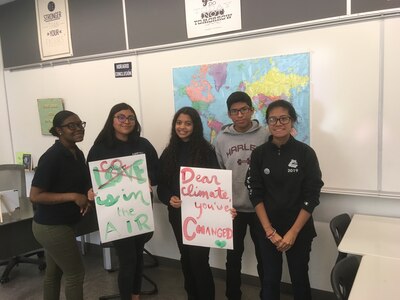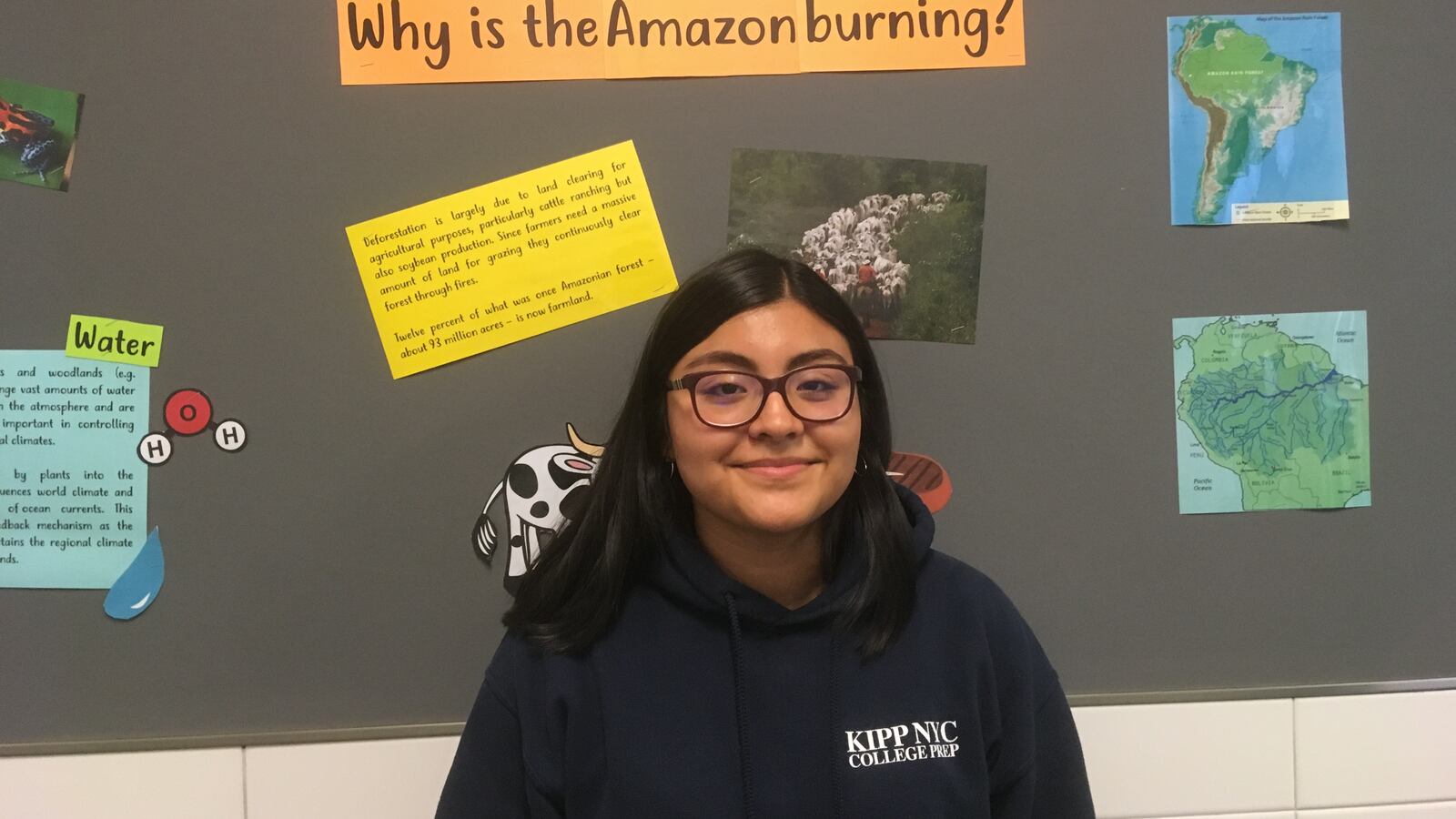To Leslie Delgado, the fight against climate change isn’t just an abstract global problem: It’s local and it’s personal.
A Bronx native and a high school senior, Delgado has seen the effects of air pollution and researched the high asthma rates in the borough, where children are more likely to go to school near a highway than in other parts of the city.
That’s one big reason Delgado and other members of her school’s environmental club are helping organize a walkout at KIPP NYC College Prep High School. They are joining thousands of other students across the city in the Global Climate Strike, which will take place in Foley Square, in Lower Manhattan, with the goal of raising awareness about environmental issues. The New York strike and others like it across the globe come in advance of Monday’s U.N. Climate Action Summit.
“I really just was astonished by the environmental injustice Bronx residents like myself are facing, and I was, from there, very determined and committed to addressing the lack of policy that is being made,” she said.
Education officials — including those at KIPP — have granted students permission to leave school to attend the strike, something Delgado says has helped give her organizing efforts more steam.
On the eve of Friday’s protest, we caught up with Delgado about what she hopes the climate strike accomplishes, how she has educated herself about climate change, and the challenge of sustaining political advocacy.
This interview has been edited for length and clarity.
What got you interested in climate activism?
I first joined my school’s environmental club around my sophomore year and I really loved the idea of being a leader within my own neighborhood and trying to find ways to lead a more sustainable lifestyle. From then on, I educated myself by reading articles, getting more involved. I’m now here, trying to lead a climate strike.
Tell me about what you have planned for the strike.
My hopes are for my school to really realize the impact we have within our own neighborhood. Just because we’re a school in the South Bronx doesn’t mean that our voice doesn’t matter. It really matters. It’s important for us to really realize how global warming and the climate really is affecting all of us.
As a charter school, KIPP’s attendance policy might differ from district schools, which the education department has announced will excuse absences for students with parental permission. How is KIPP handling attendance?
Our principal has excused absences for students who protest and have parental permission.
How has that affected your organizing efforts?
It just makes us more motivated because we’re just trying to get as many people as we can, encouraging everyone to do what they can, and just finding a group of people who are really interested.
What are your personal or political reasons for trying to organize this?
I had done research over the summer at a pre-college program at Brown, and I actually did more research on the environmental injustices the South Bronx is facing, such as the disproportionate asthma hospitalization of Bronx residents, compared to any other New York City neighborhood. And I was astonished by the environmental injustice Bronx residents like myself are facing, and I was, from there, very determined and committed to addressing the lack of policy that is being made.
Does the decision to excuse student absences for the protest take away from the statement that young people are trying to make?
I believe it’s more so for safety issues and safety concerns. I feel like, regardless, many students do have their parents’ permission. I see it more as a way to gain access and spread the word.
Tell me about the materials you’ve been handing out.
We’ve been handing out buttons that have the 20th of September date because that is the week the protests are going on, and I’ve also been handing out half-slips that contain information on where the march is, how to get there, and why it really is important to attend. Students have been passing it around school are we’re hoping that the color of the paper and the importance it has will make students go and realize, ‘Yes we can do that, and we can make a change together.’

Are there any specific changes you’re hoping the walkout contributes to, either locally or even in your own school?
Within my school, I hope we are able to realize the growing movement of this climate strike, but also reflect upon our own actions: So how can my school change their actions to be more sustainable? How can we, as a whole, grow more awareness? For example, I know my school could be more sustainable by reducing our use of plastic bottles or plastic bags.
I’m also interested in how the outreach you’ve been doing has influenced your own views about climate change — or about political activism more broadly?
It has gotten me more involved in the political aspect of global warming. Like Alexandria Ocasio-Cortez — I’ve been really keeping up with her because she is a representative of a district in the Bronx. I’ve been keeping up with all of her ideas, especially the Green New Deal, which is trying to actually find a solution to the problem we are all facing. I did go to one of her speeches in the spring, and I was able to hear her talk over the importance of the Green New Deal.
How many students are actively participating in the climate strike?
There are a group of 10 core students who are actively trying to get the strike happening, and there are about 100 students who will be attending the actual strike. My school has a special schedule [and will be dismissing students more than an hour early on Friday]. That will actually allow everyone in the school to participate in the rally after the strike. So everyone does have a chance [to take part].
Is there anything else that you wish more people knew about climate change or about student activism?
It is about student leadership and building a community within that. I think it’s important to emphasize that regardless of your age, you can make a difference and that shouldn’t stop you from pursuing what you want to do.
What kind of feedback have you’ve gotten from other students?
Throughout this week, I’ve heard just frustration from students — with the Amazon on fire and other topics. Our planet is really just dying. I’ve heard their voices. I heard their concerns. I really feel that we do all have this awareness, and we’re just trying to grow it more.
Christina Veiga and Gabi Birkner contributed reporting.


